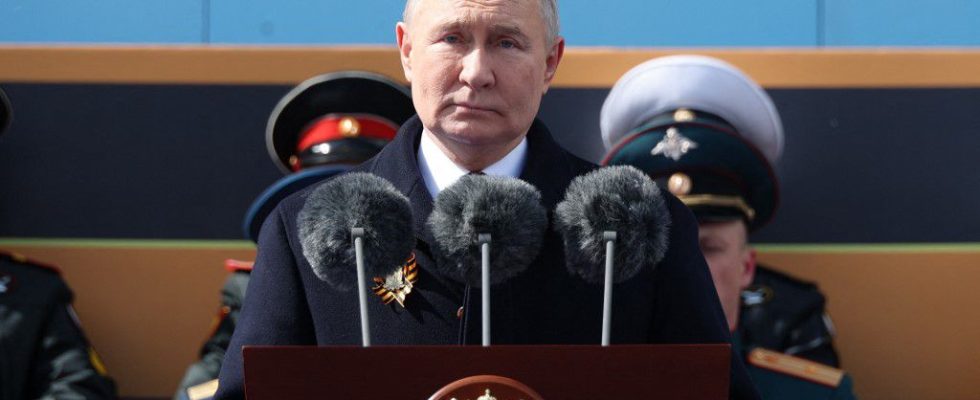Russian strategic nuclear forces are “always” ready for combat, Vladimir Putin emphasized this Thursday, May 9, during his speech to celebrate the Soviet victory against Hitler, amid tensions linked to the conflict in Ukraine.
The Russian president oversaw the May 9 military parade on Red Square, a central piece of the Kremlin’s narrative meant to exalt the country’s power. More than 9,000 military personnel, according to Russian media, armored vehicles, missile launchers and planes took part.
“Russia will do everything to avoid a global confrontation. But, at the same time, we will not allow anyone to threaten us. Our strategic (nuclear) forces are always on alert,” declared the Russian president. A sign of an ever deeper break with the West, he recently ordered the holding of tactical nuclear exercises, involving troops stationed near Ukraine, in response to Western “threats” targeting Russia.
On Thursday, Vladimir Putin accused the West of wanting to “forget the lessons” of the Second World War and asserted that Moscow, which presents itself as a counterweight to Anglo-Saxon influence, rejected “the pretension to exclusivity” of any government or alliance.
Then he reaffirmed, as during his inauguration speech this week, that Russia, in the midst of a conflict against Ukraine, was going through a “difficult period”. “The destiny of the homeland and its future depend on each of us,” he said, saluting the “heroes” who fight for Moscow on the front.
Vladimir Putin, 71, presents the assault on kyiv as an existential conflict and promises “victory” to his fellow citizens on each occasion in a fight against a Ukrainian government presented as “neo-Nazi”. The head of the Kremlin has long mobilized the memory of the Second World War – which left 27 million dead on the Soviet side – to present himself as heir to the power of the USSR and legitimize his own power.
Parades canceled
But the parade, planned for Moscow’s Red Square, did not escape the security and diplomatic fallout from the assault on kyiv. Vladimir Putin, isolated on the international scene, was surrounded on Thursday by only a few heads of state drawn from among his close allies. Among them, the leaders of Belarus, Kazakhstan, Uzbekistan, Kyrgyzstan or Turkmenistan, according to the Kremlin, which added that those of Cuba or Laos were also invited. Some parades were also canceled for “security” reasons, notably in the regions of Kursk, near the Ukrainian border, or Pskov, next to Estonia.
The Kremlin seeks to maintain the idea that the daily lives of Russians will not be disrupted by the conflict, but Ukraine has increased attacks against Russian territory in recent months. Border regions, such as Belgorod, are regularly hit by deadly strikes, responding, according to kyiv, to those of Moscow in Ukraine.
The 2023 parade was much more modest than previous years, with very little modern equipment while Russian troops were already mobilized massively on the front. Russia was then emerging from a series of bitter failures, at the dawn of a highly anticipated Ukrainian counter-offensive. A year later, the situation is quite different: the Russian army has suffered significant losses and has failed to achieve a real breakthrough, but it has recently made territorial gains against Ukrainian troops in difficulty.
